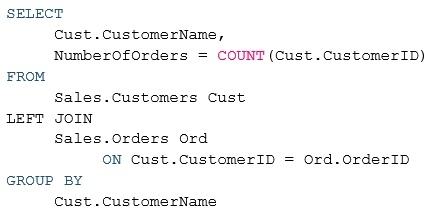

Note: This question is part of a series of questions that present the same scenario. Each question in the series contains a unique solution that might meet the stated goals. Some question sets might have more than one correct solution, while others might not have a correct solution.
After you answer a question in this section, you will NOT be able to return to it. As a result, these questions will not appear in the review screen.
You have a database named DB1 that contains two tables named Sales.Customers and Sales.Orders. Sales.Customers has a foreign key relationship to a column named CustomerID in Sales.Orders.
You need to recommend a query that returns all the customers. The query must also return the number of orders that each customer placed in 2016.
Solution: You recommend the following query:
Does this meet the goal?
Dieter
Highly Voted 5 years, 10 months agoDieter
Highly Voted 5 years, 10 months agofe
5 years, 6 months agoBillybob0604
Most Recent 4 years, 5 months agomamarach
5 years agoAnette
5 years agocyan
5 years, 3 months agoBillybob0604
4 years, 5 months agoAndybug
5 years, 4 months agomlourinho
5 years, 7 months agodragan
5 years, 9 months agoAshleyLiang
5 years, 10 months agosafiullah
5 years, 10 months ago